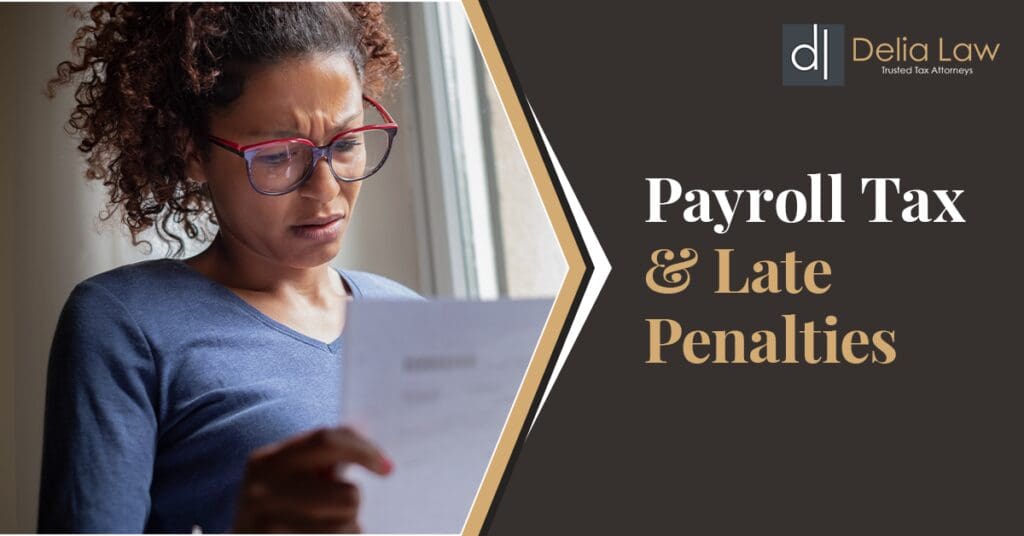As a business owner it’s crucial to withhold payroll taxes from your employee’s wages. It is equally important to also include social security, Medicare, and federal income taxes. If you are late in depositing payroll taxes, you could face severe penalties from the IRS. The IRS is known for being very aggressive in collecting tax debt, which is why it’s imperative that you deposit taxes immediately.
This scenario can be stressful for businesses, and mistakes happen from time to time. If you ever receive a notice of failure to deposit or believe you paid on time, this situation can be challenging to navigate on your own. By having an experienced attorney by your side, they can evaluate your case and work to achieve the best outcome possible. Receiving a notice that you’re late in payment can be daunting, but you have options available to mitigate any penalties you’ve accumulated.
Calculating the Failure To Deposit Penalty
You will receive a notice or letter from the IRS if you fail to make employment tax deposits on time, in the right way, or with the right amount. A penalty is placed at this point, which changes based on how long you take to pay it. The penalty is calculated under the following criteria:
- 1-5 calendar days late – 2% penalty of the unpaid deposit
- 6-15 calendar days late – 5% penalty of the unpaid deposit
- More than 15 calendar days late – 10% penalty of the unpaid deposit
- More than ten calendar days late of the first notice, or the day you get a notice for immediate payment – 15% penalty of the unpaid deposit.
Also, the IRS charges interest on penalties, meaning the amount you owe increases until you pay the balance in full. While a failure to deposit can complicate your business’s operations, there are ways you can remove, reduce, or dispute a penalty.
Removing or Reducing Penalties
Your penalty may be removed if you can prove you acted in good faith and show reasonable cause for why you failed to pay your required amount. For instance, you can request the IRS remove your penalty if you don’t have a bank account but already filed a tax return. You must follow four steps to do this:
Receive a signed and dated statement from the bank that declined your account. This statement cannot be more than two years old.
Write a letter asking the IRS to remove the penalty. The letter should explain what you did to try to get a bank account.
Attach a copy of the notice the IRS sent you.
Send your request to the address on the IRS’s notice.
Once these steps are complete, the IRS will begin examining your case and may remove your penalty.
If you cannot remove the penalty entirely, you may be able to have the penalty reduced. A reduction is typically applied to businesses that attempted to comply with tax laws but failed due to specific circumstances. You may be able to request penalty relief from the IRS, but you must provide adequate evidence to back up your claims.
Disputing Penalties
A business can dispute a penalty if it disagrees with the IRS about what is owed. You need to call the IRS immediately, explain your situation, and send a letter asking for the IRS to reconsider. It’s also wise to attach any supporting documents you have along with the letter. If you did not receive a notice but are still given a penalty, contact the IRS by phone to resolve the problem.
You may not win your dispute, but the odds of success increase with the help of legal support. A knowledgeable tax attorney can evaluate your case, provide high-quality insight, and strengthen your case overall.
How to Avoid Penalties
Penalties can be avoided altogether, whether your business uses a bank account or not. If you don’t use a bank account and haven’t filed a tax return, you can request that the IRS not send you a penalty. You’ll need to follow the same steps as if you were asking to remove a penalty, but you must also write “unbanked” at the top of the employment tax return form.
If your business cannot pay your taxes all at once, you may ask the IRS to set up an installment agreement, something your attorney can help you with as well. By setting up a payment plan, you can reduce the amount you pay at regular intervals without risking a penalty.
There are more practical solutions to avoiding penalties, as well. For example, it’s crucial to stay up-to-date with IRS announcements in case there are updates to your state’s tax laws. Also, using a payroll provider or payroll software can help you organize your employee’s wages, which can reduce human error.
What if I Can’t Pay Payroll Taxes?
If you’re a business owner and cannot pay your employment taxes, you’ll receive a notice from the IRS and a penalty. The IRS can place a lien on your assets if these taxes continue to be unpaid, even after a 10% penalty. This means the government can claim your business’s assets due to non-payment. In more severe cases, the IRS can file criminal charges against you. If the IRS believes you purposefully neglected to pay employment taxes, you could face criminal and civil sanctions and face up to five years of prison time.
You may be liable for infractions if you are tasked with collecting and paying taxes. However, the IRS will prosecute anyone who they believe plays a role in the tax violation. This is another reason that having legal representation is essential when it comes to tax matters, including penalties.
Why Hire a Tax Attorney?
By hiring an experienced tax attorney, you can ensure your business doesn’t accrue any additional penalties and also avoid any future penalties. In cases where you’ve received a penalty you don’t agree with, an attorney can examine your situation and determine how best to proceed. Even if you receive a penalty, an attorney can help you reduce the amount you owe to the IRS. Tax attorneys are also experienced in offers in compromise and payment plans, meaning there’s always an option available.
Delia Law: Your Go-To for Payroll Tax Penalties
As a business owner, your goal is to provide great products or services while ensuring the behind-the-scenes operations run smoothly. It’s crucial to deposit employee payroll taxes as soon as the due date arrives, but there are times when this doesn’t happen. You may forget one day or deposit the taxes only for the IRS to send you a notice the following day. No matter what situation you find yourself in, our team at Delia Law can help.
We understand how challenging tax penalties can be for businesses of all sizes, and we want to mitigate them as much as possible. By contacting our team, we can evaluate your situation and determine how to move forward.
Contact our team at Delia Law today for more information. We are here to help you.














